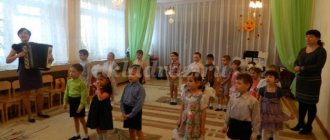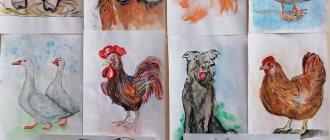Read: 3 min.
Today in the world there are more than 400 thousand of various professions, of which more than 3 thousand are in industry and construction alone. Moreover, this circle is constantly changing. The answer to the question of who the child will be will also be different depending on the age of the children, the situation in the country and the world.
The choice of a future specialty is influenced by hobbies, level of development, advice from teachers, parents, older brothers and sisters, comrades, the prestige of the chosen field, and demand in the labor market.
It is important to remember that when telling children about professions, one should not voice the negative side of any work. This may cause the child to be in denial. The information received in each specialty will broaden his horizons, and he will independently evaluate the positive and negative aspects.
How to help your child choose a profession
Choice of profession
- This is a personal decision of any person.
It often depends on the subjects studied at school and the in-depth teaching of individual sciences. The responsibility of adults
is to create an atmosphere filled with warmth and comfort, in which it is comfortable to develop and search for one’s purpose.
How to understand which profession will bring pleasure and financial well-being to a child in the future?
To do this, you need to try to study information about specialties and their relevance, including a couple of decades in the future, watch videos, documentaries, read expert bloggers, attend conferences, forums and personally communicate with representatives from a particular field.
Which profession is right for me? TAKE THE TEST FOR FREE >>
What do you like to do?
It’s enough to remember a hobby or think about what the child likes to do in his free time. Is it difficult for him to answer? It's okay, envy will come to his aid: ask which of his friends he envies and why. A classmate, a football player, or maybe a friend, whom her mother taught to sew stylish clothes. You can learn a lot of interesting things. It would be useful to remember in which lessons at school the child listens to the teacher with interest.
Another good way is to play 10 Lives. Invite your child to come up with 10 scenarios, in one of which he can be a sailor, in another - a film actor or a representative of a more mundane profession - a lawyer. Any options are possible. When we have the required number of scenarios, we change the rules: now out of 10 lives you need to choose only three.
As a result, you will have several favorite or desired activities. Write them down on a piece of paper.
Typical mistakes when choosing a specialty
A common mistake is children’s refusal to identify their interests, weaknesses and strengths. And a number of factors contribute to this: complexes, low self-esteem, indecision. Do not make mistakes when choosing a profession. To do this, consider the following:
✔ Refuse to divide specialties into “top” and “non-top” ✔ Don’t impose a personal opinion about a particular profession ✔ Don’t force you to study for the sake of a diploma ✔ Don’t put off determining your specialty ✔ Don’t be afraid of promising areas
Try not to make mistakes, understand the child: his abilities, capabilities, talents, interests. Assess the demand for the profession and the demand of society. Identify strengths and weaknesses in relation to the work ahead.
Where do “I love”, “I can” and “I will be useful” intersect?
Phil Knight, the founder of Nike, loved running (“I love it”), so he began selling running shoes and even, together with his coach Bill Bowerman, came up with a new comfortable sole - waffle. Using his gift of persuasion (“I can”), Phil enlisted the help of famous runner Steve Prefontaine and asked him to compete in the Olympics wearing Nike sneakers. It was a resounding success. So Phil’s love for running inspired millions of people to take up sports (“I’ll be useful”).
Using this story as an example, find with your child the intersections between his “I love”, “I can” and “I will be useful”, and then name several professions that will combine all three factors.
Practical recommendations for preventing errors
Based on the idea of the world of professions, it is necessary to create a complete picture of the labor market. Initially, it is important to prepare a list of requirements for the chosen craft. In this list, along with the desired profession, the following points are important: • Occupation, inclinations, interest, self-esteem • Views and beliefs, goals • Problems on the way to the profession • Opportunity for employment in the specialty and working conditions
Determine in which university the child would like to receive a vocational education in a particular specialty, and what the conditions are there. It is also worth clarifying the requirements for applicants and the duration of training.
What are you good at?
This question can be difficult to answer even for an adult when filling out a resume. The participation of parents, friends and possibly a school teacher will be required. What request would you make of your child: help with the computer, come up with a cool caption for an Instagram post? Does mathematics or literature come easier to your child? Please note that we are no longer talking about favorite subjects, but about those where the child shows the best results and quickly completes homework. Write down everything that you managed to remember together next to the column of your favorite activities.
The more often you remind your child of what he is doing well, the more motivation he will have to continue doing it. And in this way you form a realistic idea of your capabilities.
Tips for parents
Choosing a profession and finding a future calling while still a child is not easy, but it is possible. Here are some important tips for parents: ✔ When communicating with your child, observe hobbies and behavior, identify strengths, and reveal potential. ✔ Listen to your child’s desires and aspirations. ✔ Take part in research into unfamiliar professions, discover with your child prospects that you might not even know about. ✔ Attend excursions, open days at universities and enterprises. ✔ Give your son or daughter the independent right to choose a specialty, take into account their opinion.
The world is changing quickly, and it is difficult to say what professions will be in demand after graduation. Therefore, it is necessary to develop various skills in a child and look for ways to use them. Conversations with teachers, psychologists, courses, clubs, sections, seminars and master classes will help with this.
A wealth of communication skills and knowledge will allow you to easily communicate and maintain a conversation, behave correctly in a team, and increase self-esteem and understanding of desires. Self-confidence will not take long to appear. The child will feel better about those around him, he will become open and friendly.
FREE PROFESSIONAL TESTS >>
How could you be useful to the world?
Ask your child to remember an episode in his life where he was useful due to his innate qualities. For example, he returned a book that had been delayed for two weeks to the library instead of a shy friend, because he easily finds a common language with people of any age. This quality can be used consciously, and there are many professions where it is useful.
At first glance, this feature may seem neutral or even negative. As in the case of the boy Jim, who had very active facial expressions and could make the most unimaginable faces. Such an ability might just annoy teachers. But Jim noticed that his antics would make people laugh, and he began to do it on purpose to make them cheer up and get positive emotions. Today we know him as the popular comedian and actor Jim Carrey, and lively facial expressions have become his calling card.
Think of a few of your child's standout qualities and come up with useful uses for them. Brainstorm. Let these be the craziest ideas for startups or even new professions. The main rule is to justify why it can be useful to people and why exactly he can do it. Write down everything you come up with in the third column.
How to tell your child about professions
As you grow older, desires and preferences change. What is interesting to a child does not excite a teenager. It is important for parents to provide their child with the opportunity to test themselves in one area or another. You should not impose your opinion, it is advisable to give advice and support.
Children begin to enter the world of professions at the age of two. In kindergarten, the child’s horizons expand through communication with other adults and children. Tell us about common professions. They exist in everyday life; there are enough clear examples for a child: ✎
Kindergarten teacher
✎
Store salesperson
✎
Trolleybus driver
✎
Doctor at a clinic
✎
Cook
✎
Music director
At 3-4 years old, a child has a more in-depth understanding of surrounding objects: carpentry tools, equipment, dishes, clothing, an ambulance and others. He begins to understand the professions of his parents and the people around him. Reading fiction while simultaneously viewing illustrations will also broaden the child’s horizons. It is important to give the child knowledge about the specialty and its importance. Specific examples will make it easier and faster to learn information.
Children imitate their fathers and mothers, brothers and sisters, cartoon characters, they want to become doctors, police officers, teachers, firefighters. Their choices are sincere and focused on the benefit of others.
During the primary school period, even more professions are open to the student, and in the middle classes, knowledge is deepened through the first career guidance classes and tests to determine interests. Career guidance
is a tool that allows you to understand which direction will bring success and satisfaction to a person.
Teenagers, for the most part, take a responsible attitude to the choice of their future profession: they enroll in specialized schools with in-depth study of individual subjects, and use new opportunities to enter a university. Among such events: ✔ Labor teams ✔ Children's camps - as a counselor, assistant ✔ Internships ✔ Master classes
From the age of 14, a child can begin to earn money, become independent, self-confident, and independent of their parents. Temporary part-time work will help in becoming a responsible person. Employment options: courier, promoter, distribution and posting of leaflets and advertisements, display of goods, online earnings (content creation, pay for clicks, comments, sale of crafts, handicrafts, etc.).
What can you do now?
When dreaming of becoming a writer or businessman, we often imagine only the positive aspects of these professions. This error of perception is common even to adults, let alone children. For example, a writer is seen as a person who sits by the fireplace with a laptop and writes novels. He earns money through creativity and does not have to go to work every day. In real life, they rarely become famous writers right away, and sometimes they don’t become famous at all - and they combine creativity with the work of a journalist, copywriter or translator.
To find out what the business the child has chosen actually is, you need to try it. A teenager has many opportunities: volunteering, courses with project activities, and so on. You can work somewhere unofficially.
For younger children, the best option is books and films that tell about the lives of real astronauts, writers and businessmen. Read biographies of outstanding people from the field that interests your child. Offer to play in the profession of his choice, give him simple tasks (for example, write an article about how you went to the theater). If possible, introduce your child to a real businessman, lawyer or journalist. Let him tell you what his working day consists of.
Developmental tasks
When getting to know different specialties, use your imagination. Children love puzzles and role-playing games. At the same time, learning occurs unnoticed. For example, when playing shop, you have to pay money for purchases and count the change. The builder must build houses according to the plan, strictly observing it. The future captain has an excellent knowledge of geographical maps. A journalist knows how to take beautiful photographs and conduct interviews.
The profession of a doctor is very attractive for children; they are happy to treat dolls and give vitamins to their mother. But a real specialist must be well-educated and know the internal structure of a person by heart. In the game, such information is easily absorbed. Kids are ready to repeatedly make a diagnosis, looking for the correct name of the diseased organ on the diagram of the human body. At the same time, they begin to understand the importance of vocational education.
Useful books
Wonderful poets wrote poems about professions for children. For example, V. Mayakovsky “Who to be?” and J. Rodari “What do crafts smell like?” Poems by A. Barto, B. Zakhoder, V. Mikhalkov, S. Chertkov are dedicated to individual working specialties. This material must be used when working with children.
Modern publishing houses produce colorful encyclopedias dedicated to the work of adults. Thus, the publishing house “Foma” published a series of books “Who should I be?”, and the publishing house “Arkaim/Ural LTD” a series “Why? For what? Why?" and “When I become an adult.” Color illustrations attract children's attention and allow them to delve deeper into the specifics of the profession.
Fairy tale on career guidance for children 6-12 years old
Career guidance fairy tale for children from 6 to 12 years old “The Legend of a Boy”
Author: Korotaeva Irina Vladimirovna, teacher-psychologist MBDOU “Kindergarten of a general developmental type No. 2 in the village of Maslova Pristan.”
Career guidance begins in childhood, when we still play with dolls, draw patterns, drive cars and choose many different forms of activity for games. And as we grow up, we choose the professions of teachers, architects, drivers and many others. Due to the relevance of this topic, I bring to your attention a career guidance fairy tale that can be used by educators, psychologists and teachers in working with children from 6 to 12 years old, “The Legend of a Boy.” Goal: to convey to children the importance of professional self-determination. Objectives: - show children the importance of independent choice; - instill a desire to achieve goals. ***** Once upon a time in Ancient Rome there lived a boy, Aron, who was very capable. Whatever he undertook, he managed to complete everything with unprecedented ease, be it hard physical work or mental work that required logic and rational decisions. In Ancient Rome, education was structured in three stages. The first stage of education was available to every child, regardless of social status and financial situation. The second stage depended on how high and high-quality your knowledge was, and also whether it corresponded to further training. But the requirements at the second stage were very high, so that in rare cases, only a few continued their studies along with those who were from noble families. What can we say about the third stage... only the offspring of the nobility were trained in it. The end of Aron’s education was already approaching and it was necessary to make further very important choices that would pave the inevitable path in life... Aron’s family was poor enough for him to continue his studies at further levels and Aron’s parents insisted that he take up a craft business, which in essence involved a huge expenditure of effort and little profit... The boy’s friends invited him to come with them and choose the profession of stercorarius. It involved cleaning waste from sewers. At that time, this profession was new and not yet widespread. Teachers talked to him about working as a cubicular because of his easy-going nature and ability to find a common language with everyone. Today this profession is known as servants. Aron was thinking for a long time, it was difficult for him to make a choice, not only because he was pressured from all sides and persuaded, but also because there were other professions. But soon Aron made his choice. After all, the choice of profession must be made by the person himself, this is his future life and he decides for himself: whether it will be joyful or miserable... Having completed the first stage of education, he entered the second. And during his second-level studies, Aron worked in his free time. Thus, he saved up for higher education. The path he chose was very difficult. Some time passed, and Aron successfully completed his studies. Later he was an assistant to the rulers, and then the ruler himself... The essence of the legend says: make your own choice, strive to achieve your goal and even if the path is not easy, achieve your goal. After all, you are capable of much and this is your life.
We recommend watching:
Summary of a lesson on speech development in 1st grade on the topic: Professions A fairy tale about a Hedgehog for children 5 - 10 years old A fairy tale in Russian and English for elementary school The Adventures of Violets and Lilacs. Fairy tale for children in two languages
Similar articles:
Class hour. Career guidance, 3rd grade
Game program for career guidance in elementary school
Class hour “All professions are needed, all professions are important”, 4th grade
Children about the artist profession
Children about the accounting profession
Is it necessary to choose a profession once and for all?
When I ask this question at a master class, ten-year-old children answer “No.” They saw their parents completely change their lives, leave their regular jobs and start their own business or get a second education. But not everyone has such an example before their eyes, so it is important to tell the child that it is also possible to change your decision. It’s normal to lose interest in something you once loved and start doing something completely new. Knowing this, it will be easier to choose a profession.
It has been proven that 90% of the skills that an adult possesses (the ability to play an instrument, knowledge of languages, etc.) were acquired during adolescence, mainly between 11 and 16 years old, when our cognitive abilities are focused on the external world. The more you allow your child to try during this period, the wider his horizons will be.
Works about doctors
Doctor is a very important profession. Children are one of the first to meet her, because it is the doctor who accompanies them almost from birth. Little ones are attracted to the medicine bottles, stethoscope and white coat. The game of doctor is one of the most favorite among preschool children.
K. Chukovsky. "Aibolit"
The most famous and beloved doctor of all generations. He heals animals. But they mean children. Aibolit is responsive, always ready to help, and the animals are very grateful to him for his work.
D. Herriot. “From the memoirs of a rural veterinarian”
A veterinarian is a doctor who treats animals. The book by the English writer D. Herriot tells the story of the beginning of the career of a rural veterinarian. Children will learn interesting details about animals and also become familiar with the work of a veterinarian.
L. Razumova. “For injections, for injections!”
A poem from the perspective of a children's doctor. The doctor's work is described by himself. Responsibilities are briefly addressed. The figure of the doctor does not evoke fear; on the contrary, she appears benevolent and welcoming. The poem is recommended for relieving anxiety before visiting the clinic for some children.
Simple rules
There are parents who prepare detailed lectures about professions for their children. However, kids are not interested in special terms, historical facts and long stories. The description of professions for children can be structured according to the following scheme:
- The name of the specialty, the benefits brought, the actions performed (in a generalized form, without details).
- Introducing the child to the character’s place of work, the tools used, and workwear. At this stage, it is recommended to use visual aids (pictures, presentations, cartoons, excursions).
- Emotional living of the profession. Children will enjoy listening to poems or stories that describe interesting incidents from the lives of geologists, firefighters, pilots, and archaeologists. They love to get involved in story-based play, cooking a real meal as a chef or doing their dolls' hair.
- Description of the final result. For the dentist it will be a cured tooth, for a seamstress - a new dress, for a farmer - grown vegetables and milk.
How is this done?
Children are very curious, and this must be taken advantage of. Invite your child to conduct a joint investigation to find out how a favorite doll, new pajamas, delicious candy or table service came into the world. Of course, it’s not worth going too deep into the process. The information that is published in children's encyclopedias will be enough for the baby. But this is enough to understand how much human effort was required to create ordinary objects.
When telling your child about professions, emphasize that the final product is the fruit of the work of many specialists. For example, in order for clothing to appear, you must first grow flax or cotton, harvest it, and use special machines to process it, dividing the stems into individual fibers. These will be spun into threads at a spinning mill. The weaver's threads will be used to weave a cloth. The seamstress will sew clothes that the driver will take to the shops. The seller will help visitors choose the most beautiful outfit. By treating things with care, we show respect for all the people who worked for their appearance.






